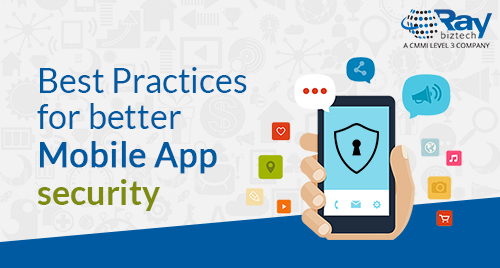Follow these Best Practices for better Mobile App security

Mobile Apps have become an integral part of our lives; we start our day with a mobile app and end our day with it. All day long, we move across several apps for our numerous requirements from booking a taxi, to shopping, food delivery etc. Our life revolves around these apps. While using these apps we share our personal data with them, which means we need to ensure that whatever information we are sharing with these apps is secured with them and is not compromised at any level. Organizations are taking utmost care to keep our data safe in every possible way, most importantly by developing mobile apps that are more secured. Improper security gives a bad name to the organization and leads to unhappy customers with loss of revenue. Mobile App security is a necessity and below is some best practices to be followed by the organizations to make their app more secure.
1. Security from beginning itself
Mobile App developers should consider security as an important feature while designing an app. They should inculcate all the security steps that make an app more secure from the beginning itself. More Bugs and vulnerabilities in a code mean more threat to data. This means, from the day 1 of coding you need to start safeguarding it. Complicate and minify your code so that no one can reverse engineer it. Test several times and fix bugs as and when they are exposed. Design your code in way that you can easily update and patch. Ensure that your code is agile enough that it can be updated at the user end post a breach. Always use code hardening and code signing.
2. Data Encryption
It is essential to encrypt every single unit of data at every step while developing a mobile app. Whether it is a communication between applications, back-end server, or web services, it is significant to encrypt. Encryption helps in securing the data from any and every kind of breach.
3. Using secured APIs
Servers should have great security measures in order to prevent unauthorized access and protect confidential data. In addition, APIs should be properly verified. Containerization is considered as the best way to carefully store documents as well as data. Additionally, encryption using SSL, VPN, and TLS offers an extra layer of security. APIs that are not authorized and are loosely coded attract more data breach.
4. User authentication
A vital component of mobile app security is the user authentication and authorization. It must cover an acute consideration of user privacy, identity management, session management and device security features. The enforcement of 2FA (two-factor authentication) and MFA (multi-factor authentication) allow for better user security and will help take benefit of the proven security technologies such as OpenID Connect protocol or OAuth 2.0 authorization framework.
5. Continuous Testing of the App
Testing is a never-ending process. Your code must be tested several times for vulnerabilities that can be corrected before your application is ready to hit an app store. The most relevant testing methods that must be followed are exploratory testing, regression testing, and even automated testing. Define a dedicated timeline for testing the apps and rectifying the issues while doing so. It is assumed that emulators for devices, operating systems as well as for browsers can help you in testing the performance of your app in a much better way.
Organizations must follow the above basic best practices to ensure complete mobile app security and offer secured app to the consumer. In the coming years mobile app security will become a key differentiator compared to the look and feel of an app that will ultimately determine the success of the mobile app.
About Raybiztech
Raybiztech is a leading Global Information Technology (IT) Services and Solutions, a CMMI Level 3, ISO 27001:2022 Certified Company. We are a Member of NASSCOM, HYSEA, NJTC, and AIIA. Raybiztech offers comprehensive end-to-end IT Services for Business Application Development, Enterprise Solutions, Enterprise Collaboration Services, Testing and Quality Assurance Services, Cloud Computing and IT Infrastructure Management to organizations in the Banking & Finance, Insurance, Healthcare, Manufacturing, Retail, Media & Entertainment, Leisure & Travel, Telecom and Energy & Utilities verticals as well as Independent Software Vendors.

